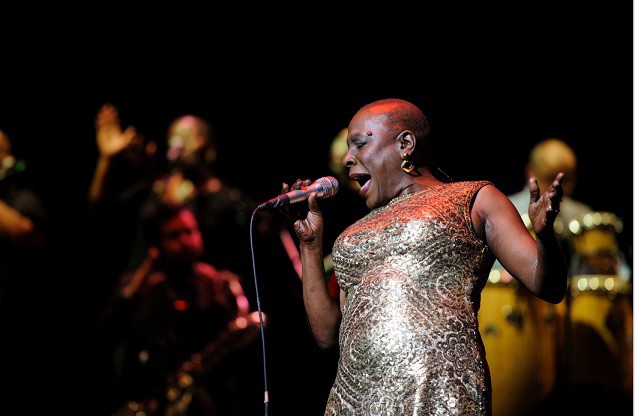Barbara Kopple is a two-time Academy Award winning filmmaker. Her recent credits include “Shelter,” which explores the psychological trauma created by military service, the effects that remain long after active duty, and the difficult road back to a normal life for these women and men, and “Running from Crazy,” which received an Emmy nomination for Outstanding Documentary or Nonfiction Special.
Kopple produced and directed “Harlan County USA” and “American Dream,” both winners of the Academy Award for Best Documentary Feature.
“Miss Sharon Jones!” made its World Premiere at TIFF 2015. The doc tracks the talented and gregarious soul singer of the Grammy-nominated R&B band Sharon Jones & the Dap-Kings during the most challenging year of her life, when Jones was diagnosed with a life-threatening illness.
The film opens July 29 in New York and August 5 in LA.
W&H: Describe the film for us in your own words.
BK: This film is about the strength of Sharon’s soul and the perseverance of the human spirit. It’s a film about family — not just the family we’re related to by blood, but also the friends we so carefully choose to accept into our lives as family members, and how those people in your life bring hope and a shoulder to lean on in our darkest moments.
It’s about kick-ass music and leaving it all out there on the stage, which is something Sharon exemplifies and does in spades, day in and day out.
W&H: What drew you to this story?
BK: What drew me to this story was Sharon’s own story of finding success, and her will to never give up on her dream no matter how many obstacles life has thrown at her.
Sharon is a fighter: you can hear it in her lyrics, you can see it in her dancing, and its very evident in the way she lives her day to day life. She is always moving forward, no matter how much weight is on her back.
W&H: What do you want people to think about when they are leaving the theater?
BK: Of course I’d love it if people left the theater humming and singing along to some of Sharon’s songs they just heard! But ultimately I’d just love for people to walk out of the theater feeling the need to go home and hug those closest to them, and for them to want to tell those people how much they love and mean to them. This is a film that shows just how precious life is, and that no matter what, the show must go on.
W&H: What was the biggest challenge in making the film?
BK: It was such a pleasure to have made this film, to have been able to share Sharon’s story of struggle and perseverance, and to get so close to Sharon herself. I will say that when you grow so close to someone and have love for them as a person, it is very difficult to have to watch them go through such personal strife and turmoil. It’s been so inspirational to see how Sharon’s pushed forward and let nothing stop her.
W&H: How did you get your film funded? Share some insights into how you got the film made.
BK: Originally the film had been given funds by VH1. Eventually we put in the money ourselves to continue being able to tell Sharon’s story. Every film you work on is different when it comes to funding, and you never really know how it’s going to end. During the post-production process we considered doing a crowdsourcing campaign, but then Thom Powers from the Toronto International Film Festival came for a screening and after a long discussion with him, we just knew we had to put all of our focus into getting it ready for that festival, and that ended up being so worth it.
W&H: What’s the biggest misconception about you and your work?
BK: I think the biggest misconception about me is that I only make documentaries. And while I love non-fiction storytelling, I’ve also been fortunate enough to direct narrative films, television dramas, and commercial spots.
I think a lot of the time when an artist focuses primarily on one area of filmmaking, they get pigeon-holed within that genre or medium of storytelling. I’m drawn to telling stories in many different ways.
W&H: What’s the best and worst advice you’ve received?
BK: The best advice I’ve ever received was to not let anything hold me back from making a film I wanted to make, and to not let money get in the way of doing something I’m passionate about.
The worst advice I’ve ever received was to let others dictate my path and to not go where my heart was urging me to.
W&H: What advice do you have for other female directors?
BK: My advice is to find a subject you feel strongly about, and to let nothing get in the way of you making your film. If you’re enthusiastic and driven about a project, people will take notice, they will help you, and you will get it done. Tell the story that you want to tell with all of your heart and everything you’ve got.
W&H: Name your favorite woman-directed film and why.
BK: I have many favorite woman-directed films, so here’s a list of my favorite women directors that could go on and on: Heidi Ewing, Rachel Grady, Laura Poitras, Judith Helfand, Kristi Jacobson, Cecilia Peck, Aviva Kempner, Jessica Edwards, Dawn Porter, Amy Berg, Amy Grey, Rory Kennedy, Chantal Akerman, Lauren Greenfield, Cynthia Wade, Liz Garbus, Connie Fields, Chris Hegedus, Sarah Polley, Gabriela Cowperthwaite, Crystal Moselle, Abigail Disney, Gini Reticker, Rachel Boynton, Irene Taylor-Brodsky, Margaret Brown, Nancy Buirski, Marow Chermayeff, Amy Hobby, Rebbie Ratner, Suzanne Mitchell, Jessica Sanders, Rebecca Miller, Elizabeth Chai Vasarhelyi, Kim Longinotto, Lourdes Portillo, Lee Grant, Moira Demos, Jennie Livingston, Lucy Walker, Jeanie Finlay, Kathryn Bigelow, Jane Campion, Ava DuVernay, and Nora Ephron.







